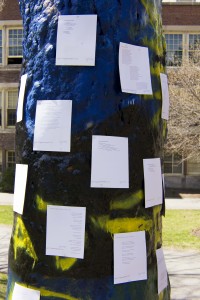Last night I had a discussion with some fellow poets about whether poetry is capable of dying. Poetry has been around us since we, as humans, have been able to speak, so we know that poetry has survived. But is Poetry capable of dying? I thought up a scenario where humans evolve to become sea animals and because we are sea animals we do not have hands, but fins. We lose what is the most important tool to a writer; opposable thumbs. Will poetry be dead then, if we can’t write it? “No,” as one of the fellow poets said, “because we will come up with a way to use our fins and we will write with whatever material we can get.” So then I came up with another scenario where all humans die of a sudden natural disaster. In this scenario we all die but all works of literature ever written is kept in an indestructible box that can only be opened by putting in the code “0000.” What if the giraffe evolves to create its on language–a language that is not at all similar to ours–and it finds our literature, but isn’t able to understand it? Is poetry dead then? There are two ways one can see this scenario. Either poetry is dead, or it is alive in a different species. For example, we are dead, but maybe because of our deaths the giraffes will create their own poetry based on how we died–the same way that we write about dinosaurs or any other extinct species. And maybe the giraffes have their own kind of poetry, so poetry is alive in their species.
So, my question is, will poetry ever die? I’ve been having an existential crisis, if you can’t tell.
db pena

